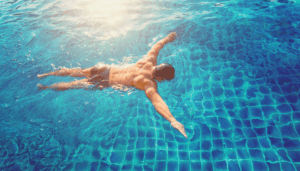Drinking more water can seem like a daunting task in your busy schedule, but the simple fact is, it needs to be a priority.
With all the functions your body carries out, water is the essential ingredient to performing those functions properly and giving you the most energy.
Without water, your body does not work at its best self.
As an endurance athlete in my early twenties, I was pushing my body week after week to perform feats of distance running both in training and in racing.
Knowing very little about diet and nutrition, I was not fueling myself as well as I should have been and was struggling with low energy levels, slow muscle recovery, and joint pain on a consistent basis.
For all the running I was doing, I was also not losing any weight or building muscle tone, but was actually gaining weight and not getting any faster out on the race course.
I knew I needed to make a change before I literally ran myself in the ground and caused an irreversible injury after breaking my body down so severely.
The first step to that change was learning about diet and nutrition, especially hydration.
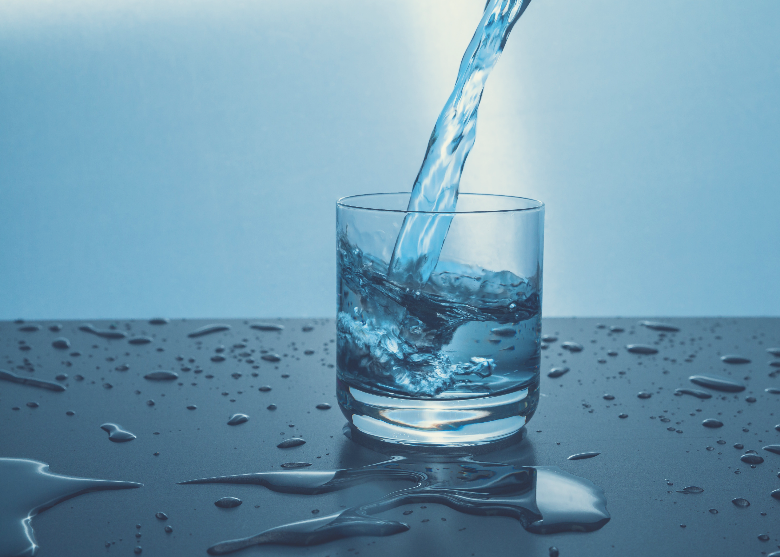
The Importance of Hydration
Your past coaches and trainers may have made you roll your eyes when they talked about the importance of hydration in your diet and nutrition routine, but they were right.
Water has so many incredible benefits for your body in both mental and physical ways that you would be doing yourself an incredible disservice if you did not listen to those trainers and coaches.
What Happens When You Are Dehydrated?
Dehydration becomes a problem when your body is using more water than it has access to.
This means your body is not able to perform its regular functions like easy digestion, regulation of body temperature, supporting and growing muscles, and comfortable joint health, let alone keep up with the stress demands of exercise.
Being dehydrated can lead to dizziness, fatigue, diarrhea, less bathroom trips, constipation, and extreme thirst.
A few of the more severe problems that arise when you are dehydrated include having low blood pressure, a faster heart rate than normal, and less blood flow to your hands and feet making them feel cold or tingly on a regular basis.
There is also a possibility of going into kidney failure or suffering heatstroke when you are severely dehydrated.
Essentially, without enough water, you are not going to perform your best, be your best, or be able to digest the best.
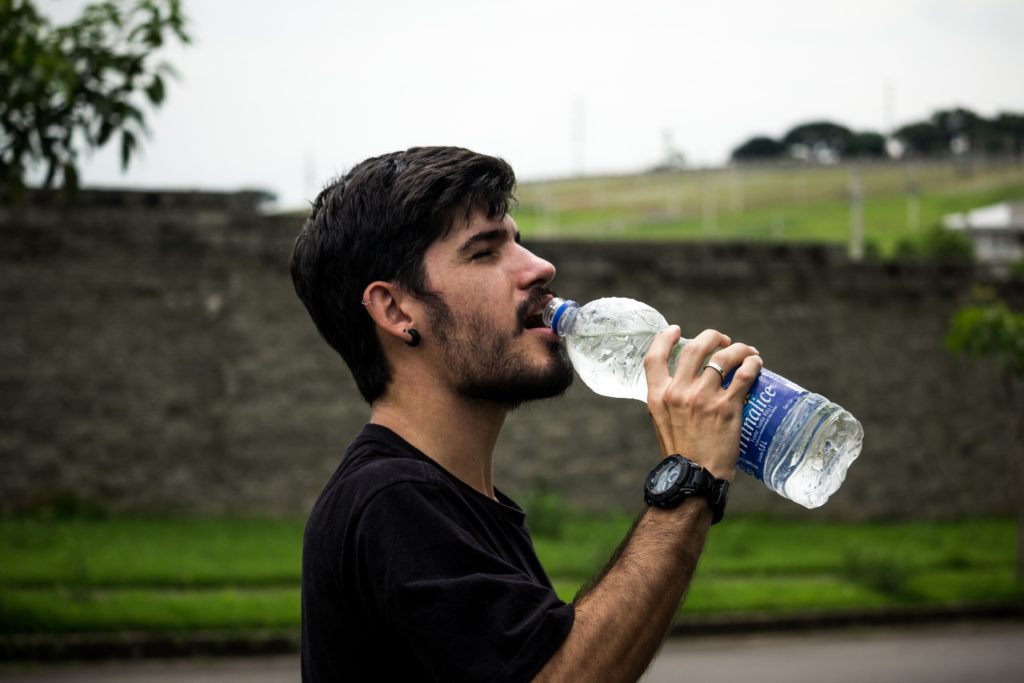
Signs of Dehydration
There are many signs of dehydration, but some are more obvious than others.
To begin with, if you are thirsty, you are already dehydrated and should be drink more water as soon as possible.
If you are failing to sweat or go to the bathroom, especially if your urine is dark in color, you could be in the stages of severe dehydration.
Take extreme precaution with these symptoms and seek out some medical attention to get yourself back to a normal level of functioning.
If you feel dizzy at any point during your day, or during exercise, and you know you have not had enough to drink, definitely seek shade, water, and a cold washcloth to the head to avoid putting yourself at risk of severe dehydration and heatstroke.
Health Risks of Dehydration
Hyponatremia, or severe dehydration, can have some serious health risks.
For instance, kidney problems like UTIs, kidney stones, and kidney failure are all common symptoms of a lack of water in the system.
Severe dehydration can also lead to seizures, loss of consciousness, heat cramps, heat exhaustion, and heatstroke.
On the lighter, more common level, being dehydrated means your body cannot digest food as easily and your bodily functions do not perform as well as they should.
To break down food properly, your body needs a lot of water for cells to complete their jobs, so make sure you give the body both what it wants and needs by having lots of water on hand.
Other, less serious health risks of dehydration, but ones you do not want to experience on a consistent basis, can include poor skin quality, lack of energy, and low muscle growth.
While these risks are not life-threatening, they do take away from your quality of life.
What is The Right Amount of Hydration?
While there are many schools of thought on the amount of water you should drink each day, most of them are fairly consistent in how important water is to the body and how copious amounts is better than a moderate amount.
You may have often heard that you should drink eight, eight ounce glass of water each day, but that number is on the low side.
Instead of following that slightly outdated number, you need to focus on hydrating for your person body’s needs.
How Much Water Should Someone Consume Daily?
The general rule of thumb for daily water consumption is half your body weight in ounces each day.
This is the recommended amount just for your body to efficiently do its regular daily functions.
Once you factor in a workout, or steady movement, you need to drink an additional four to six ounces for every 15 minutes of exercise you complete.
While half your body weight in ounces might seem like a huge amount of water at first, and send you on more bathroom trips than you would prefer during the day, your body will re-regulate after about ten days.
This is also around the time you will start seeing all the incredible benefits of drinking an appropriate amount of water for your body.
If you can fight through those first ten days where it seems like all you are doing is chugging water and going to the bathroom, you will not be disappointed.
How Do You Determine if You Are Hydrated Properly?
Apart from doing blood and urine tests, you can pay attention to a few things at home to determine if you are well-hydrated or if you need to sip more:
- Frequent urination that is light in color
- Consistent sweating when exercising
- Easy bowel movements
- Have clear mental energy
- You are not thirsty
As you start naturally drinking more water, you are going to be able to easily tell the difference between the times when you are well-hydrated versus dehydrated.
You will easily notice a change in your energy levels and digestion patterns after experiencing real hydration for a few weeks.
I can promise that once you know what it feels like to be properly hydrated, you will never want to go back to drinking less water.
Do Age and Activity Levels Impact Hydration Levels?
Your age does impact your hydration levels as the recommended daily requirements change as you get older.
This is because your body has less water reserves the older you get. For instance, anyone age 19 and older needs about 91 ounces of water each day while a 14-18 year old needs about 77 ounces per day.
This difference could be due to the fact that water affects brain functioning, supports healthy joints, and improves lung functioning, which are all things that increase as we age.
In terms of activity, you need to be sure you are paying attention to the amount of water you drink versus how long you workout.
In general, for every 15 minutes of activity, you should drink an additional four to six ounces of water.
If your workouts go over 30 minutes, you need to pay extra attention to how you feel and how your thirst is changing, as your athletic performance can dwindle if you are not properly hydrated.
Health Benefits of Drinking More Water
If the effects of dehydration are so many, then you know the health benefits of drinking more water are going to be just as many if not more.
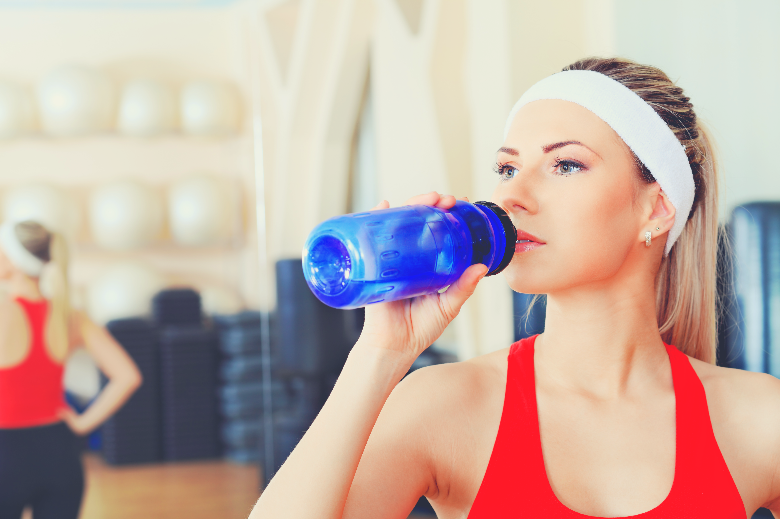
Why is Staying Hydrated Crucial to Someone’s Health and Fitness?
Humans are made up of about 60% water.
Every major organ of the body has a majority of water with the brain and heart being 73% water, lungs 83%, and skin 64%.
Since water is so crucial to the body, it is no wonder that it is crucial to your body’s health and fitness as well.
Drinking a large and consistent glass of water throughout the day means you will have better digestion.
Digestion takes a huge amount of water to carry out, especially if you eat a largely plant-based diet or incorporate a lot of protein into your meals.
The liquid helps break down food and absorb the nutrients, so you can feel less bloat and get the most benefits from what you eat.
Additionally, drinking more water is crucial to your health since it gives you clearer skin, better energy, keeps you more focused, supports muscle growth, and keeps your bathroom trips regular and easier as water leads to reduced constipation issues.
In terms of supporting your fitness routine, with the body’s joints being 80% water, drinking more water means you will suffer less joint pain as your joints have better shock-absorbing abilities since they are better supported.
Add in the fact that water is an essential part of your lungs functioning well, your liver being able to process lactic acid, and your kidneys flushing your system, drinking more water is going to be vital to your overall bodily functions as well as playing a key role in supporting your health and fitness goals.
On top of that, drinking more water over other beverages like sodas, coffee with added ingredients, teas, and energy drinks means you will lose weight more easily as you are hydrating appropriately and not giving your body unnecessary sugars and synthetic ingredients attempt to digest.
If you are an endurance athlete, or regularly workout for longer than half an hour, you need to pay extra close attention to the amount of water you drink as your athletic performance will decline if you are dehydrated.
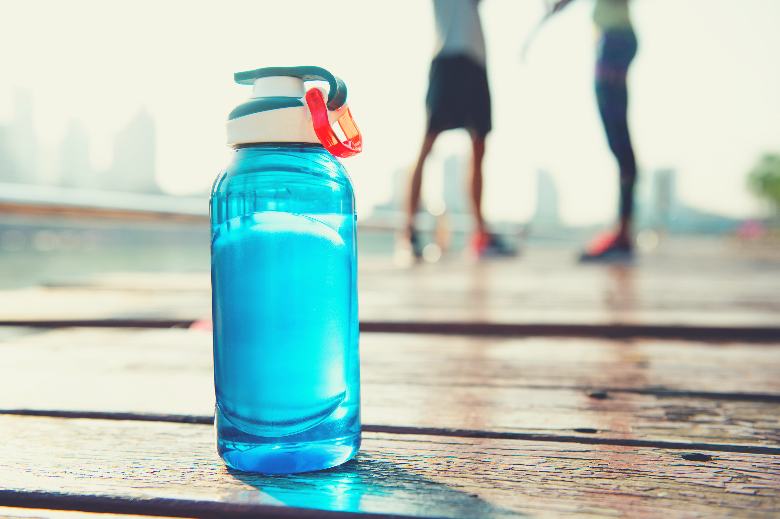
Tips on How to Drink More Water and Get Hydrated
Drinking more water does not have to be an arduous task.
There are simple tips and tricks you can use to increase your water consumption on a daily basis so you can get hydrated and stay hydrated throughout the day.
- Drink a large glass of water right after waking up in the morning, or before you eat or drink anything. This includes before you have your morning coffee.
- Keep two reusable water bottles: one at home and one at work. That way you do not have to carry them between two places and risk losing them or leaving them behind.
- Draw a line on a water bottle every four ounces and label it with the time of day you need to drink to that line. This will keep you consistently hydrated throughout your day.
- Set an alarm to go off every 30-60 minutes as a reminder to drink two to four ounces of water.
- Flavor your water with lemon, cucumbers, or fruit to give it a an extra special feel without consuming additives often found in water flavoring products.
- Sip on sparkling water (check the ingredients label as many have added sugars). Limit your amount of seltzer water, though, as it can hurt the enamel in your teeth.
- Use a larger water jug to refill your smaller water bottle as needed if you do not have easy access to a water source like a water fountain or sink.
- Sip your water from a straw as you are likely to drink more water using this method.
- Start a water drinking challenge with your friends or coworkers to keep each other accountable and have a little, friendly competition.
- Drink a glass of water before each meal or snack. About four to six ounces will help boost your hydration levels and aid in digestion.
To Sum Up
However you go about drinking more water, just make sure that you do.
With all the health benefits of body functioning, increased energy, clearer skin, aiding in weight loss, and supporting muscle growth, you are going to want to drink the recommended amount every single day.
More importantly, have fun with your water drinking.
This could mean getting a cute reusable water bottle to drink from, or rewarding yourself in some small way if you reach your daily water goal.
Now, start sipping!






